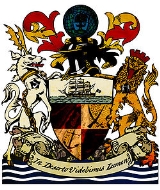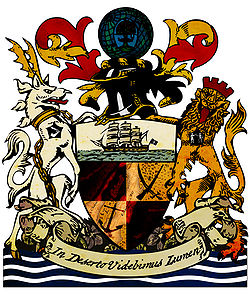
Royal Kennebecasis Adventurers Society
Encyclopedia

Privateer
A privateer is a private person or ship authorized by a government by letters of marque to attack foreign shipping during wartime. Privateering was a way of mobilizing armed ships and sailors without having to spend public money or commit naval officers...
s founded in Saint John, New Brunswick
Saint John, New Brunswick
City of Saint John , or commonly Saint John, is the largest city in the province of New Brunswick, and the first incorporated city in Canada. The city is situated along the north shore of the Bay of Fundy at the mouth of the Saint John River. In 2006 the city proper had a population of 74,043...
between the late 18th and early 19th century. However, in modern times it refers to a purported conspiratorial organization which acts as a shadowy power behind the throne
Power behind the throne
The phrase power behind the throne refers to a person or group that informally exercises the real power of an office. In politics, it most commonly refers to a spouse, aide, or advisor of a political leader who serves as de facto leader, setting policy through influence or manipulation.The...
, allegedly controlling New Brunswick
New Brunswick
New Brunswick is one of Canada's three Maritime provinces and is the only province in the federation that is constitutionally bilingual . The provincial capital is Fredericton and Saint John is the most populous city. Greater Moncton is the largest Census Metropolitan Area...
affairs through present day governments and corporations, usually as a modern incarnation or continuation of the Kanabicases Adventurers Society. It is unknown at what time, or for what purpose the term 'Royal' was added as a prefix to the society name, however it has been speculated that it was added as a satirical insult to the idea of Crown control within the colony, or to further the conspiratorial notion that the group exerts true control over political affairs as a shadow power. The acronym RKAS is pronounced like the word ruckus, ˈrʌkəs.
Historical Origins
Local populist history states that the Kanabicases Adventurers Society was formed around the time of the arrival of LoyalistLoyalist (American Revolution)
Loyalists were American colonists who remained loyal to the Kingdom of Great Britain during the American Revolutionary War. At the time they were often called Tories, Royalists, or King's Men. They were opposed by the Patriots, those who supported the revolution...
settlers in Saint John in 1783 and achieved its first prominence during the 1790s with great profits made from raiding enemy shipping along the coasts of New England and the Maritime provinces. The groups greatest successes came during the period of the War of 1812
War of 1812
The War of 1812 was a military conflict fought between the forces of the United States of America and those of the British Empire. The Americans declared war in 1812 for several reasons, including trade restrictions because of Britain's ongoing war with France, impressment of American merchant...
, when numerous Saint John privateers captured prizes from American merchant vessels. However, privateering by New Brunswick vessels began prior to the British declaration of war, and required surreptitious gathering of men and letters of marque. The RKAS gained power during this time acting as a sort of recruiter and organizer of expeditions. Calls for men were often concealed in the New Brunswick Gazette as ventures against the French, and would use pseudonyms for vessel names, as demonstrated in this recruitment advertisement for the privateer ship Ruckus (notably identical to the pronunciation of the RKAS acronym) that appeared in the New Brunswick Gazette on 14 July 1812:
Ruckus Privateer.
Commanded by Capt. John Black, Who has been on several cruises, and met with great Success.
All Gentlemen Volunteers; Seamen, and able bodied Landsmen, who wish to acquire Riches and Honor, are invited to repair on board the Ruckus Privateer ship of War, now laying in Saint John Harbour; mounting Twelve Carriage Guns, with CohornHand mortarThe hand mortar is a firearm that was used in the late 17th century and 18th century to throw fused grenades. The action was similar to a flintlock, matchlock, or wheellock firearm , but the barrel was short, usually less than 2 inches to 4 inches long , and had a...
s, swivels, &c bound on a Cruize to the Southward for five Months against the French, and all His Majesty's enemies, and then to return to this Harbour.
All volunteers will be received on board the said ship - or by Captain John Black, at his Rendezvouse at MacPherson's Tavern, along Scotch Row, where they will meet with all due Encouragement, and the best Treatment; Proper Advance will be given.
Debate surrounds the choice of the Kennebecasis River
Kennebecasis River
The Kennebecasis River is a tributary of the Saint John River in southern New Brunswick, Canada. The name Kennebecasis is thought to be derived from the Mi'kmaq "Kenepekachiachk", meaning "little long bay place." It runs for approximately 95 kilometres, draining an area in the Caledonia Highlands,...
[at the time, spelled Kanabicases] for inclusion in the society name, as opposed to the name of the city or river of Saint John or the Bay of Fundy
Bay of Fundy
The Bay of Fundy is a bay on the Atlantic coast of North America, on the northeast end of the Gulf of Maine between the Canadian provinces of New Brunswick and Nova Scotia, with a small portion touching the U.S. state of Maine...
. The Kennebecasis River itself was sparsely populated and seldom utilized up to the late eighteenth century, thus inviting many historians and theorists to speculate that its use within the society title might indicate that many of the islands, coves and inlets of the river could have been frequented by local smugglers and privateers as an in-land refuge away from the heavier population of the nearby city of Saint John. Another similar theory suggests that the mention of the river furthers the belief that the infamous pirate, Captain William Kidd
William Kidd
William "Captain" Kidd was a Scottish sailor remembered for his trial and execution for piracy after returning from a voyage to the Indian Ocean. Some modern historians deem his piratical reputation unjust, as there is evidence that Kidd acted only as a privateer...
had buried his life's treasure somewhere along the lower Kennebecasis River. This theory argues that some of the United Empire Loyalists
United Empire Loyalists
The name United Empire Loyalists is an honorific given after the fact to those American Loyalists who resettled in British North America and other British Colonies as an act of fealty to King George III after the British defeat in the American Revolutionary War and prior to the Treaty of Paris...
who had been granted land along the Kennebecasis River may have uncovered Captain Kidd's treasure while clearing their land for agriculture. These Loyalists then supposedly used the found money to finance Saint John's first generation of privateers during the 1790s.
Modern R.K.A.S.
The speculated influence of the RKAS is wide ranging, from exerting control in modern political elections and "back-door" policy decisions within the province of New Brunswick, to the historical legacy of their activities, such as the ongoing legends of gold being buried on Navy Island in Saint John Harbour. Much like conspiracy theories involving the presence of IlluminatiIlluminati
The Illuminati is a name given to several groups, both real and fictitious. Historically the name refers to the Bavarian Illuminati, an Enlightenment-era secret society founded on May 1, 1776...
or Masonic
Freemasonry
Freemasonry is a fraternal organisation that arose from obscure origins in the late 16th to early 17th century. Freemasonry now exists in various forms all over the world, with a membership estimated at around six million, including approximately 150,000 under the jurisdictions of the Grand Lodge...
imagery in architecture and currency, it has been suggested that the traditional Saint John image of the Loyalist Man exists as an icon of RKAS control, even in the form of the current trademark logo of the city. Supporters of this theory point out that the term Loyalist Man is an anagram of 'manly to sail' which bears a strong resemblance to the original motto of the Kanabicases Adventurers Society, "It Takes a Man to Sail". For many this link to the RKAS explains why the image of the Loyalist Man has not been replaced by a more contemporary, and inclusive insignia for the City of Saint John, despite years of debate over the relevance of the symbol in modern society.
See also
- Navy IslandNavy Island, New BrunswickNavy Island was a small island situated within the Inner Harbour of Saint John, New Brunswick in Canada. For centuries, Navy Island existed as a narrow, oval shaped hunk of rock sitting roughly at the turning point of the harbour where the deep open water ends and the harbour approaches the...
(Saint John Harbour, New Brunswick) - Navy Island GoldNavy Island Gold"Navy Island Gold" is a traditional New Brunswick song about the site of a supposed buried treasure on Navy Island in Saint John Harbour. It is most likely based on accounts of privateers from the Royal Kennebecasis Adventurers Society who captured prizes from American merchant vessels during the...
- PrivateerPrivateerA privateer is a private person or ship authorized by a government by letters of marque to attack foreign shipping during wartime. Privateering was a way of mobilizing armed ships and sailors without having to spend public money or commit naval officers...

